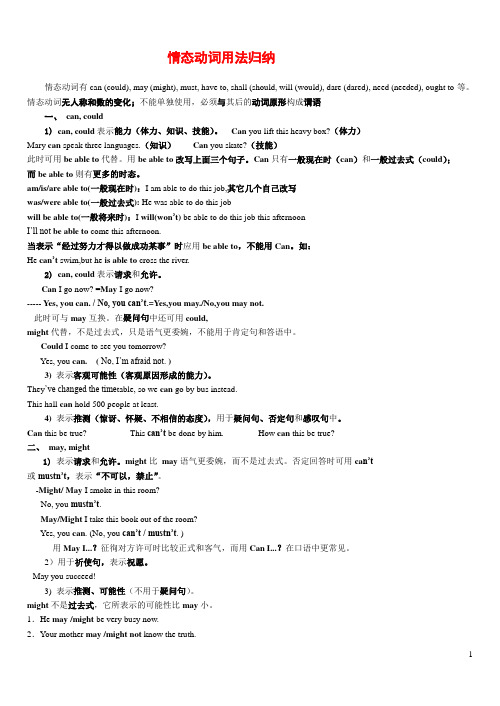情态动词can和could用法详解.docx
- 格式:docx
- 大小:11.58 KB
- 文档页数:2

cancould 1 表示现在的能力,用can: I can’t decide which to choose.我不能决定选哪个好。
While I sympathize I can’t really do much to help.尽管我很同情,我却不能真正帮多少忙。
2表示将来的能力,通常不用can或could,而用be able to的将来时态: I’ll be able to speak French in another few months. 再过几个月我就会讲法语了。
One day people will be able to go to the moon on holiday. 总有一天人们可以到月球上去度假。
但是,若表示现在决定将来是否有能力做某事,则可用 can: Can you come to the party tomorrow 你明天能来参加我们的聚会吗? 3表示过去的能力,有时可用could,有时不能用could,具体应注意以下几点:①若表示过去一般的能力即想做某事就随时可做某事的能力,可用could: Could you speak English then 那时候你会说英语吗②若表示过去的特定能力即在过去特定场合做某事的能力,则不能用could,而用was were able to do sth,或用 managed to do sth,或用 succeeded in doing sth 等。
He studied hard and was able to pass the exam. 他学习很努力,所以考试能及格。
At last he succeeded in solving the problem. 他终于把那个问题解决了。
【注】could不用来表示过去特定能力通常只限于肯定句,否定句或疑问句中,它则可以表示过去特定的能力: I managed to find the street but I couldn’t find her house.我想法找到了那条街,但没找到她的房子。


can和could的用法
can和could是英语中常用的两个情态动词,它们都可以表示请求,能力,许可和可能性的意思,但不同程度不同。
Can通常用于表达能力或权力,而Could用于表达请求,可能性或客气的许可。
情态动词can和could的第二人称形式分别是can和could,而一般疑问句及否定句则分别是can和cannot或couldn't。
can用来表示能力,意思是“能够”,例如“I can speak English” (我会说英语);“Can you solve this problem?” (你能解决这个问题吗?);“You can't go there alone”(你不能一个人去那里)。
could是can的过去式,表示能力,常用句式为“I could do it”(我可以做);“Could you help me?” (你能帮助我吗)。
不过,在表示能力时,could也可以表示整体以及单一的概念,例如“You could finish the work in an hour”(你可以在一小时内完成这项工作);“I could run a mile” (我可以跑一英里)。
另外,could也常用于表示可能性,表达的意思是“可能会”,例如“He could be late”(他可能会晚到);“It could be a good idea”(那可能是个好主意)。

英语语法教学微课教案(情态动词can和could)第一章:情态动词can和could的概述1.1 情态动词can的用法表示能力表示可能性表示允许1.2 情态动词could的用法表示过去的能力表示可能性表示礼貌的请求第二章:情态动词can和could的构成和发音2.1 情态动词can的构成和发音构成:can + 动词原形发音:[kæn]2.2 情态动词could的构成和发音构成:could + 动词原形发音:[kʊd]第三章:情态动词can和could的肯定句和否定句3.1 情态动词can的肯定句和否定句肯定句:主语+ can + 动词原形+ 其他否定句:主语+ can't + 动词原形+ 其他3.2 情态动词could的肯定句和否定句肯定句:主语+ could + 动词原形+ 其他否定句:主语+ couldn't + 动词原形+ 其他第四章:情态动词can和could的疑问句4.1 情态动词can的疑问句疑问句:Can + 主语+ 动词原形+ 其他?4.2 情态动词could的疑问句疑问句:Could + 主语+ 动词原形+ 其他?第五章:情态动词can和could的实战练习5.1 能力练习编写句子,用情态动词can表示能力。
编写句子,用情态动词could表示过去的能力。
5.2 可能性练习编写句子,用情态动词can表示可能性。
编写句子,用情态动词could表示可能性。
5.3 允许练习编写句子,用情态动词can表示允许。
编写句子,用情态动词could表示礼貌的请求。
第六章:情态动词can和could的常用短语6.1 情态动词can的常用短语be able to:能够can't wt to:迫不及待can't help but:禁不住can't stand:无法忍受6.2 情态动词could的常用短语could be:可能是could have:本可以做could try:可以尝试could you please:请问可以吗第七章:情态动词can和could的时态配合7.1 情态动词can的时态配合can + 现在时态:表示一般现在时can + 过去时态:表示一般过去时can + 将来时态:表示一般将来时7.2 情态动词could的时态配合could + 现在时态:表示过去的能力could + 过去时态:表示过去过去时could + 将来时态:表示过去将来时第八章:情态动词can和could的对比分析8.1 情态动词can和could的用法对比can表示现在的能力、可能性、允许;could表示过去的能力、可能性、礼貌的请求。

can/could作为情态动词时,有5种意思,同时对应用种用法,具体如下:
情态动词
用法
例句
can/could
表示能力
I could carry ten-kilogram-weigh rice, but I cannot now.过去我能扛动10千克的大米,但是现在不行了。
在肯定句中,表示客观可能性,并不涉及具体某事会发生,常用来说明人或事物的特征。
要表达具体某事实际发生的可能性时,不用can,需用could,may,might。
Tom may stay at home this afternoon.汤姆今天下午可能待在家里。
表示请求和允许。
表示请求,口语中常用could代替can,使语气更委婉。
In soccer, you can’t touch the ball with your hands.足球比赛中,你不能用手碰球。
表示对现在的动作或状态进行主观的猜测,主要用在否定句和疑问句中。
Can the man over there be our mater?在那边的男人是我们校长吗?
表示惊异、怀疑、不相信等态度,主要用在否定句、疑问句和感叹句中。
How can you be so crazy!你怎么会如此疯狂!。

情态动词用法归纳情态动词有can (could), may (might), must, have to, shall (should, will (would), dare (dared), need (needed), ought to等。
情态动词无人称和数的变化;不能单独使用,必须与其后的动词原形构成谓语一、can, could1) can, could表示能力(体力、知识、技能)。
Can you lift this heavy box?(体力)Mary can speak three languages.(知识)Can you skate?(技能)此时可用be able to代替。
用be able to改写上面三个句子。
Can只有一般现在时(can)和一般过去式(could);而be able to则有更多的时态。
am/is/are able to(一般现在时):I am able to do this job,其它几个自己改写was/were able to(一般过去式): He was able to do this jobwill be able to(一般将来时):I will(won’t) be able to do this job this afternoonI’ll not be able to come this afternoon.当表示“经过努力才得以做成功某事”时应用be able to,不能用Can。
如:He can’t swim,but he is able to cross the river.2) can, could表示请求和允许。
-----Can I go now? =May I go now?----- Yes, you can. / No, you can’t.=Yes,you may./No,you may not.此时可与may互换。
在疑问句中还可用could,might代替,不是过去式,只是语气更委婉,不能用于肯定句和答语中。
语法精讲:情态动词can与could一、表示能力(1)表示现在的能力,用can:I can’t decide which to choose. 我不能决定选哪个好。
While I sympathize, I can’t really do much to help.尽管我很同情,我却不能真正帮多少忙。
(2)表示将来的能力,通常不用can或could,而用be able to的将来时态:I’ll be able to speak French in another few months.再过几个月我就会讲法语了。
One day people will be able to go to the moon on holiday.总有一天人们可以到月球上去度假。
但是,若表示现在决定将来是否有能力做某事,则可用can。
如:Can you come to the party tomorrow?你明天能来参加我们的聚会吗?(3)表示过去的能力,有时可用could,有时不能用could,具体应注意以下几点:①若表示过去一般的能力(即想做某事就随时可做某事的能力),可用could。
如:Could you speak English then?那时候你会说英语吗?②若表示过去的特定能力(即在过去特定场合做某事的能力),则不能用could,而用was (were) able to do sth,或用managed to do sth,或用succeeded in doing sth 等。
如:He studied hard and was able to pass the exam.他学习很努力,所以考试能及格。
At last he succeeded in solving the problem.他终于把那个问题解决了。
【注】could不用来表示过去特定能力通常只限于肯定句,否定句或疑问句中,它则可以表示过去特定的能力。
英语语法教学微课教案(情态动词can和could)第一章:情态动词can和could的概述1.1 情态动词can的用法表示能力表示允许表示请求表示可能性1.2 情态动词could的用法表示过去的能力表示可能性表示礼貌的请求第二章:情态动词can和could的构成和发音2.1 情态动词can的构成和发音构成:can + 动词原形发音:[kæn]2.2 情态动词could的构成和发音构成:could + 动词原形发音:[kʊd]第三章:情态动词can和could的句子结构3.1 情态动词can的句子结构主语+ can + 动词原形+ 其他3.2 情态动词could的句子结构主语+ could + 动词原形+ 其他第四章:情态动词can和could的举例练习4.1 能力方面的举例I can swim.She can speak English.4.2 允许方面的举例You can e in.They can't watch the movie.4.3 请求方面的举例Could you help me?Can you pass the salt?4.4 可能性方面的举例It can rn today.There could be a traffic jam.第五章:情态动词can和could的运用5.1 情态动词can的运用日常生活中表示能力、允许、请求和可能性。
5.2 情态动词could的运用过去表示能力、可能性、礼貌请求。
第六章:情态动词can和could的时态搭配6.1 情态动词can的时态搭配can + 动词原形:一般现在时could + 动词原形:一般过去时6.2 情态动词could的时态搭配could + 动词原形:过去能力、可能性、礼貌请求第七章:情态动词can和could的否定句7.1 情态动词can的否定句主语+ can't + 动词原形+ 其他主语+ cannot + 动词原形+ 其他7.2 情态动词could的否定句主语+ couldn't + 动词原形+ 其他主语+ could not + 动词原形+ 其他第八章:情态动词can和could的疑问句8.1 情态动词can的疑问句Could + 主语+ 动词原形+ 其他?Can + 主语+ 动词原形+ 其他?8.2 情态动词could的疑问句Could + 主语+ 动词原形+ 其他?Can + 主语+ 动词原形+ 其他?第九章:情态动词can和could的转移句型9.1 情态动词can的转移句型主体句:主语+ can + 动词原形宾语从句:主语+ can + that/if + 宾语从句9.2 情态动词could的转移句型主体句:主语+ could + 动词原形宾语从句:主语+ could + that/if + 宾语从句第十章:情态动词can和could的综合练习10.1 情景对话练习设计不同场景,让学生运用情态动词can和could进行对话。
(一)can和could的用法1.表示能力或客观可能性,还可以表示请求和允许。
如:Can you finish this work tonight?你今晚能完成这项工作吗?Can you finish the work in such a short time你能在那么短的时间内完成这项工作吗?Man can not live without air.人离了空气不能活。
What can you do?你能干点什么呢?Can you pass me the books?你能给我递一下书吗?Could you help me,please?请问,你能帮助我吗?— Can I go now? — Yes,you can.—我现在可以走了吗?—你可以。
注意:①could也可表示请求,语气委婉,主要用于疑问句,不可用于肯定句,答语应用can(即could不能用于现在时态的简略答语中)。
如:Could I come to see you tomorrow?我明天能来看您吗?Yes,you can. (否定答语可用No,I'm afraid not.)是的,你可以。
(不,恐怕不行。
)②can表示能力时,还可用be able to代替。
如:I'll not be able to come this afternoon.我今下午不能来。
can 和could 只能用于现在式和过去式两种时态,将来时态用be able to 来表示。
He could help us at all.他完全可以帮助我们。
With the teacher's help,I shall be able to speak English correctly.由于老师的帮助,我将能准确地讲英语。
2. “can”表达推测例:Can the news be true? 这消息会是真的吗?The news can't be true. 这消息不会是真的吧。
情态动词can与could用法归纳一、表示水平(1) 表示现在的水平,用can:I can’t decide which to choose. 我不能决定选哪个好。
While I sympathize, I can’t really do much to help.即使我很同情,我却不能真正帮多少忙。
(2) 表示将来的水平,通常不用can或could,而用be able to的将来时态:I’ll be able to speak French in another few months.再过几个月我就会讲法语了。
One day people will be able to go to the moon on holiday.总有一天人们能够到月球上去度假。
但是,若表示现在决定将来是否有水平做某事,则可用can:Can you come to the party tomorrow?你明天能来参加我们的聚会吗?(3) 表示过去的水平,有时可用could,有时不能用could,具体应注意以下几点:①若表示过去一般的水平(即想做某事就随时可做某事的水平),可用could:Could you speak English then?那时候你会说英语吗?②若表示过去的特定水平(即在过去特定场合做某事的水平),则不能用could,而用was (were) able to do sth,或用managed to do sth,或用succeeded in doing sth 等。
He studied hard and was able to pass the exam.他学习很努力,所以考试能及格。
At last he succeeded in solving the problem.他终于把那个问题解决了。
【注】could 不用来表示过去特定水平通常只限于肯定句,否定句或疑问句中,它则能够表示过去特定的水平:I managed to find the street, but I couldn’t find her house.我想法找到了那条街,但没找到她的房子。
情态动词 can 和 could用法详解
can 和 could用法详解
1.表示能力, could 是 can 的过去。
如:
Can you speak English?你会说英语吗?
Could you speak English then?那时候你会说英语吗?
2.表示许可,注意以下用法:
(1)对于现在或将来的“许可” ,要区分以下两种情况:
a.表示请求允许( 即请求别人允许自己做某事) ,可用 can(=may) 或 could(=might)(
这里的 could并不表示过去,而是表示现在,只是语气较委婉) 。
如:
Can [May, Could, Might] I come in?我可以进来吗?
b.表示给予允许( 即自己允许别人做某事) ,一般只用can(=may) ,
而不能用could或might。
如:
A: Could [Can] I use your pen?我可以借用你的钢笔吗?
注意:
B:Yes, of course you can. 当然可以。
( 注意 : 此处不用 Yes, you could)
(2)对于过去的“许可” ,也要区分以下两种情况:
a.表示过去一般性允许( 即表示某人随时都可以做某事) ,用 can 的过去式 ( 即 could)
When I lived at home, I could watch TV whenever I wanted。
如:to. 我住在家里时,想什么时候看电影就可以什么时候看( 一般性允许 ) 。
b.表示过去特定的允许(即表示在过去某一特定情况下允许进行某一活动) ,则不用而需换成其它表达( 如: had permission或was [were] allowed to)。
如:
I was allowed to see the film yesterday evening.昨天晚上允许我去看了电影could, ( 特定
的允许,所以不能用could)。
3.表示推测:
(1)对现在或将来的推测, can 通常只用于否定句或疑问句中,一般不用于肯定句:
It can’ t be true.那不可能是真的。
What can they be doing?他们会在干什么呢?
Can it be Jim?那会是吉姆吗?
但 could(可以表示现在) 则可用于肯定句中:
We could [may, might] go to Guilin this summer.今年夏天我们可能要去桂林。
( 将来可能性 )
You could [may, might] be right, but I don’ t think you are.你可能是对的,但我
并不你是的。
( 在可能性 )
注意: can 有时也用于肯定句中表示推测,这主要见于:
a.表示理上的可能性( 即从理上或上分析是可能的,但未必会生) 。
如:
Anybody who wants to can become a prison visitor.只要愿意,任何人都可以到去帮助解决犯人的困。
Mary is in poor health. She can be ill at any time.的身体不好,她随都可能
会生病。
Evem experienced teachers can make mistakes.即使是有的教也可能出。
b.后接“ be, get, seem, become +形容”,表示“有会” 、“ 常会”等。
如:
It can get very hot here.里有会很。
She can be very unpleasant.她有很令人。
My grandmother could be very unpleasant at times.我祖母有候会人非常不愉快。
(2)对过去的推测,必须在 can, could 之后接动词的完成
式:
a. can + have+去分 ( 主要用于否定句或疑句,一般不用于肯定句) 。
如:
I saw him just now;he can’ t have gone to Japan.我他,他不可能到日本去
了。
Why does he know this? Can someone have told him about it?他怎么知道 ? 会是哪个人告他了 ?
b. could +have+去分 ( 可用于肯定句、否定句或疑句) ,主要用于:
①表示去的推,其意“可能( 已 ) ⋯⋯”。
如:
He could have gone home.他可能已回家了。
Where could he have gone?他会到哪里去了呢 ?
He couldn ’ t have seen her there.他不可能在那儿到她。
②表示去没有的可能性( 即某事本来可以生,但却没有生) ,意“本来可
以⋯⋯”。
如:
He could have told her, but he didn’ t choose to.他本来可以告她的,但他没有
做。
③用来委婉地某人去做某事而没有去做,意“本来⋯⋯”。
如:
You could have helped him.你本来来帮助他的。
④表示“差点儿就要” 。
如:
I could have died laughing.我差点儿笑死了。